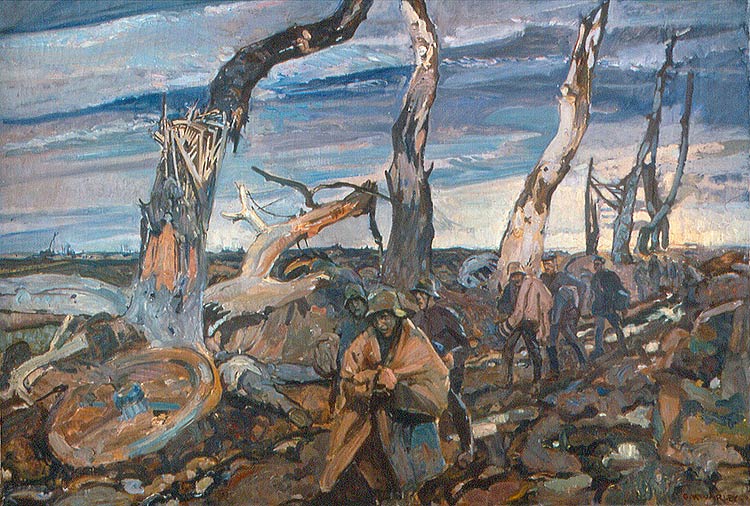Frederick Varley Vimy Ridge
Cure your children's warring madness,
bend our pride to your control;
shame our wanton selfish gladness,
rich in goods and poor in soul.
Grant us wisdom, grant us courage,
lest we miss your kingdom's goal.
August of this year, 2014, marks the 100th anniversary of the beginning of the 1st World War, the first truly global conflict. More than nine million combatants died, along with at least seven million civilians. Another twenty million were injured. Canada suffered more casualties in the four years of this conflict than the six years of World War 2 and it must have been a stunning blow to national well-being given that many were confident the war would be over by Christmas.
When I began in ministry in 1980 and in my first two pastorates there were WW1 veterans or the widows of soldiers. One woman in outport Newfoundland was a war bride who came to Canada from Britain and never ventured far from the tiny community for the rest of her life. The last Canadian vet was John Babcock who died in 2010 at the age of 109.
In the next months I will explore what that terrible war means both historically and in terms of the present day. The assassination of Archduke Franz Ferdinand in June of 1914 was the blasting cap for catastrophic explosions around the world and while we may be puzzled by the impact of the violent death of one person we know that a single event can be the catalyst to ignite much greater conflicts. In retrospect the war between Britain and Argentina during the Margaret Thatcher era seems like an absurd over-reaction to sovereignty claims for the tiny Falkland/Malvinas Islands. No one really knows what triggered the genocide in Rwanda which led to the deaths of more than half a million. China and Japan are currently posturing over some other seemingly desolate islands. The list goes on and on. If there is any evidence of the reality of human evil it is our propensity to engage in great violence over events of presumably vague consequence.
I will read Margaret MacMillan's much praised historical work, The War That Ended Peace, which is waiting for me on the shelf. I think I will buy Joe Sacco's graphic work The Great War which portrays the Battle of the Somme. I may go back to two excellent Canadian novels, Three Day Road by Joseph Boyden, and The Stone Carvers by Jane Urquhart. I'm sure they would be even better the second time around. I think I will do some research into war art and chaplaincy during World War I, http://www.warmuseum.ca/cwm/exhibitions/guerre/faith-fatalism-e.aspx perhaps with a trip to the Canadian War Museum in Ottawa. http://www.warmuseum.ca/cwm/exhibitions/guerre/home-e.aspx Both AY Jackson and Frederick Varley of the Group of Seven were war artists in the days before readily usable photographs.
When Harry Emerson Fosdick wrote the hymn God of Grace and God of Glory in 1930 he was well aware of the profound impact of WW1 and the third verse is a prayer that it would never happen again. Sadly, it did and there are still wars and rumours of wars today.
I don't consider myself a history buff, but this may be a year for all of us to remember and ask what lessons can be learned as followers of the Prince of Peace. After all, so many of our older churches have plaques which recognize those who served and died in that conflict.
Do you know much about World War 1? Are you interested in learning more? Would this be an opportunity for study and reflection in your congregation?


5 comments:
I am a history buff. I have all those books on my shelf. You have inspired me to reread them. I also have a couple of books on the art of WW1. Also just got a couple of Cd's of the music of WW1. I can see what my next couple of months will be. Thank you.
Thanks for your response Laurie. Interesting to hear you have so many of those books and other resources. I suppose I should watch the film War Horse as well, although it didn't get the greatest reviews. Knowing that you are an enthusiastic film-goer you probably saw it as well.
Forget the film "War Horse" didn't like it. I try and go to Ottawa 3 or 4 times a year (best Tea shop in Ontario). Always go to the War Museum, the art shows keep changing.
Three day Road, I haven't got, but I am sure some library will have it.
I am now half-way through Margaret Macmillan's book. Among the typical brinkmanship , empire-building causes, is the racial, tribal, and sectairian phobias that existed at all levels of society. It seems evident from my reading isthat governments were worried that in the event that war would be declared, the populous would not respond. But when the crisis hit, people responded because of those very attitudes towards their foes.
Post a Comment